If you have no prior knowledge about the trademark office, trademark registration, or anything to do with the trademark process, you’re in the right place!
Becoming self-employed and starting my side hustle was one of the best decisions I ever made, and for as long as I can remember, I’ve maintained a steady side hustle while working full-time.
When you work hard to start a successful blog and business, you don’t want someone copying your business ideas and identity.
Building a brand and establishing yourself as an expert helps you stand out in the crowd, so trademarking is a critical aspect of protecting your business.
I often get asked the question, “what can I trademark?”
And I’m not surprised that many people don’t understand the difference between legal terms such as trademarks, patents, and copyright.
I created this guide to break down everything you need to know about what, when, and how to protect your intellectual property and business.
Remember that even though trademark law can seem overwhelming, this article will break it down, so it’s not so scary.
If you decide you need to trademark your company name without additional fees down the road then check out this done for you trademark service, and seek legal advice to get a better understanding of trademarking for a small business.
Also, through this link only, you can save $50 on your trademark package. Use coupon code at checkout: MARKAVOFRIEND50
Have you asked yourself if you’re running your blog or business legally?
Are you missing some of the important legal pages you need on your blog or business website?
Check out my legal bundle that includes templates for the three legal pages you must have on your website (plus tons of business contracts you’ll need).
Table of Contents
What Is A Trademark?
Before I address the question “what can I trademark,” I want to start by defining what a federal trademark is. As the USPTO (the United States Patent and Trademark Office) puts it:
“A trademark is a word, phrase, symbol, and/or design that identifies and distinguishes the source of the goods of one party from those of others.”
Now, this may bring another question to mind if you’re offering a service, and that is: Can a non-tangible thing, such as a service, be trademarked? The answer is yes, but it’s actually called a “service mark.” The USPTO defines it as:
“A service mark is a word, phrase, symbol, and/or design element that identify and distinguishes the source of a service rather than goods.”
In the next few sections, I’ll give some examples of what CAN and CAN’T be trademarked and dive deeper into the different types of trademarks.
Also, here are top 10 legal strategies for protecting your IP.
What Can I Trademark?
There are countless things that you can trademark as a business or individual. You can trademark distinctive things like a company name, slogan, symbol, sound, and logo.
The list starts with a phrase you’ve come up with.
For instance, even Mr. T has a trademark for his catchphrase, “I pity the fool,” dating back to 2011. Or it can be your business name.
You can also trademark a word you’ve created or assigned a new meaning to, much like Band-Aid, Popsicle, Frisbee, and many product brands have done.
Symbols can also be trademarked, such as Apple’s iconic apple, with one bite taken out of it. Colors, devices, and countless other creations or branded elements can also be eligible for a trademark.
So, if you’re curious if X, Y, or Z can be trademarked, the answer may very well be yes.
Just remember: You can trademark just about anything that distinguishes you or your goods from another party or company with some exceptions. However, you should remember that trademark protections only exist in commercial settings.
What You Cannot Register as a Trademark?
You can’t trademark a book, song, film, music, or something you invented for example. Look into copyright or U.S. patent, which we will discuss briefly below to show you the difference.
Works of art, novels, songs, and even computer coding are examples of common copyrights instead of trademarks.
The USPTO will not grant trademark protection to any mark that is confusingly similar to an existing mark.
Before submitting a trademark application, conduct a thorough trademark search here to ensure that your mark does not already exist.
You should also search for similar names in your industry.
Generic Terms and Descriptive Terms
You also can’t trademark words that are too descriptive or generic such as “cold ice cream,” or “best ice cream.”
These terms are too generic or descriptive to get trademark legal protection or exclusive rights to use them.
Similarly, you cannot trademark a generic word such as “computer” or “notebook” because again, those are widely used and everyone uses them.
Federally Registered Trademark Standard
Under U.S. law, trademark legal protection is generally governed by the Lanham Act and various state laws that provide for the registration, protection and enforcement of trademarks.
The Lanham Act provides a comprehensive framework for protecting trademarks from infringement by other entities in U.S. commerce.
Generally speaking, a trademark must be distinctive — either inherently distinctive or acquired distinctiveness through use — and capable of being used to identify the source of goods or services.
In other words, there should be no likelihood of confusion in the minds of consumers as to what a particular mark is used for and who owns it.
Related Video on Trademark and Legal Tips:
In addition to federal trademark registration, there are many things you need to protect your business legally.
Click to watch the video to learn more (and subscribe to my YouTube channel for more legal and business tips)
What Are The 3 Types of Trademarks?
There are three types of trademarks, and you might choose to pursue any one of them, depending on what you’re looking to protect.
-
Trademarks and Service Marks:
Phrases, words, and symbols that help define a company’s offerings. Trademarks are for goods, while service marks are for services.
-
Collective Mark:
Much like trademarks, but used to identify a large group of goods. Collective marks allow the trademark owners to profit from many goods from a single trademark.
-
Certification Marks:
Certification marks are used to protect a product’s characteristics, like items that claim to be “100% silk” could fall under a certification mark.
Looking at this list, you might get the feeling that you can trademark just about everything, but realize that a trademark doesn’t give you a monopoly over that symbol, word, phrase, etc.
It only gives you the right to protect its association between your goods and services.
For instance, McDonald’s has trademarked their slogan — “I’m Lovin’ It” — but if someone were to use it outside of the food industry with a secondary meaning, it wouldn’t likely be considered trademark infringement.
The Difference Between a Trademark, Patent, and Copyright
To better understand the protections a trademark gives you, there are good reasons why it’s worth comparing the differences between a trademark, a patent, and a copyright.
-
Trademark Legal Protection:
Protects your words or symbols in connection to your goods or services such as your domain name, unique logo, etc. Get started with an affordable trademark package here.
-
Copyright Protection:
Protects original works of authorship such as literary work or artistic works, like songs, lyrics, and books.
-
Patent Legal Protection:
Protects inventions and alternations to past inventions.
Depending on your business, you may need to apply for some or all of the above to protect your creative works and everything associated with your company.
Why Trademarking is So Important
If someone were to steal your business or company logo and start using it for their services or otherwise take your product idea and infringe upon your rights, a trademark is there to protect you.
However, “unregistered trademarks,” which take effect by default when you create something, can also be effective.
When you use (TM) in your logo, which represents an unregistered trademark, you still afford yourself important protections without the hassle of trademark registration.
For instance, if you design a unique logo and put (TM) in it, then a company recreates something very similar; the burden of proof will be on them. So you can use this symbol to show the use of the mark or trade name.
So, now that you know what you can trademark let’s look at what you can’t.
What You Can’t Trademark
Before we explain what exactly you can trademark, it’s always worth ruling some things out that you absolutely cannot trademark.
Both goods and services can be trademarked, or service marked, but you can never try to trademark:
- Proper names or the likeness of a person without their consent: This includes the likeness of any past or current U.S. President, which is also explicitly stated as an exclusion.
- Generic words, phrases, and symbols: Think about the classic heart shape or words like “love.” These can never be trademarked as they’re just too prevalent already.
- Symbols or insignias associated with the U.S. government: For instance, you could never try to trademark a symbol associated with the U.S. Military or U.S. Customs.
- Disparaging or vulgar words/phrases: You also can’t trademark words or symbols that could be perceived as scandalous, immoral, or deceptive, like a logo that mimics symbols used in healthcare for a non-professional company.
It’s worth noting that you also can’t trademark short sounds or motifs, but only because you need copyright instead.
What You Can Trademark
Many elements relate to your business or brand that you can trademark, and you must put in the time and effort to do it to protect your company!
For instance, your logo, unique brand name, and even your signature color scheme could be trademarked.
Of course, some things are tough to trademark even if it’s possible, such as descriptive words or names that aren’t distinguishable from other products (such as Legal Bundle for Coaches – this is one of my product names by the way), names that include geographic area or locations (think “California Pizza Kitchen“), generic names, deceptive names, common words and surnames that pertain to a product (think “Chamberlain Garage Doors“).
Still, even if you think it may be tough, it’s worth looking into the trademark process so you can enjoy the protection of a trademark.
When Should You Register Your Trademark?
The best time to trademark a product name is when you intend to sell the goods or services for the first time.
In general, for businesses operating in limited regions (like a local small town), an unregistered trademark is likely plenty effective.
However, national companies need to register to gain protection across the country and give them a better platform for keeping their symbols safe from infringement.
If your company currently operates in a geographical area that goes beyond one small town, it’s worth looking into the trademark process to make sure you’re protected.
Common Law Trademark Rights
A business in the United States obtains common law rights to a name as soon as it is used in commerce.
That is, as soon as you begin selling a product or service, you can claim common law ownership of the trademark without registering it with the United States Patent and Trademark Office (USPTO).
But keep in mind, in order to bring legal action for trademark violation or violation of your intellectual property rights, you must first have federal trademark registration in place.
Registration of a Trademark
The process of registering a trademark can take 9-12 months, so you should start as soon as possible. That’s how long it will take to receive a certificate of registration.
The first step is to visit the website of the USPTO and enter your application online.
You’ll need to select a class of goods (which you can do by entering your business type into their search) and then fill in all of your business information.
Although the application process may seem straightforward, things can get quite complicated if you haven’t conducted a proper trademark search including similar marks, and similar products and if you end up using descriptive marks or generic marks and try to get federal protection for those.
How Many Trademark Applications Do I Need to Fill Out?
You will need to complete a separate application for your name, logo, and symbol(s).
If you’re only able to file once, make a standard character claim to assert that your trademark covers your company’s name regardless of its font. However, it won’t protect your logo.
How Long Does a Trademark Registration Last?
A trademark will last for 10 years once the USPTO has accepted it. You can refile an unlimited number of times.
How Much Does It Cost to Trademark Something?
The trademarking process isn’t cheap!
The USPTO has an electronic application fee ranging from $275 to $325(depending on class), but there are also fees associated with trademark maintenance.
This is the best place to get started with your trademark registration at an affordable price!
How to Maintain Your Trademark
Many people don’t realize that they can lose their trademark if they don’t maintain it properly.
In their article called “Keeping Your Registration Alive,” the USPTO says:
“…the registration owner must file required maintenance documents at regular intervals. Failure to file the required maintenance documents during the specified time periods will result in the cancellation of the U.S. trademark registration or invalidation of the U.S. extension of protection.”
They also have a handy post-registration timeline that’s worth reviewing. Once you do, you might be surprised by just how involved the trademark registration process is!
Should You Hire a Trademark Attorney?
After you take a look at all the paperwork you’ll need to continue to file to maintain your trademark, you might begin to think it’s all too much of a hassle — but it’s well worth the protection a trademark will afford your company.
An attorney who specializes in trademark registration can answer your question, “what can I trademark easily?”
The key is to work with a professional who knows what they’re doing.
While hiring a trademark attorney may sound like an expensive pursuit, you should still consider hiring a trademark lawyer to handle the paperwork for you instead of trying to do everything on your own and making mistakes.
Limited Liability Company
A limited liability company or LLC differs from a trademark registration or registered mark.
An LLC is a legal business entity created by the state in which they are registered.
This means that the LLC is separate from its owners, who are called members.
It’s important to understand that LLCs do not provide brand identity or intellectual property protection that trademarks do.
Instead, LLCs provide liability protection for small business owners and other benefits to their members. This means that if the company experiences financial difficulties or is sued, the individual member’s personal assets are typically not at risk.
It’s the best way to limit your legal liability at the state level.
Also, are you making smart decisions for your business? Legitimize your business and separate it from your personal assets with my LLC Operating Template.
Learn all about LLC’s – when to form and whether it’s a good idea for your business in this blog post.
Book our 1 hour LLC service here.
Frequently Asked Questions About Federal Trademark Protection
To wrap things up, here are answers to some common questions.
Also, here are 18 most critical questions to ask a lawyer before starting a business.
Can a phrase be trademarked?
You can trademark short phrases if the words take on a distinctive meaning, but you’ll have to prove that for commercial use.
Does an existing trademark completely prevent others from using what I have protected?
As a trademark owner, no one else will be able to use the words, phrases, or symbols you have trademarked in conjunction with a similar good or service.
However, companies in different industries may still use your trademarked goods.
What’s the difference between ® and ™?
You can use the ™ logo for claimed trademarks, but they are not registered with the USPTO yet.
You can start using that symbol when you file the application. The ® logo, on the other hand, represents a trademark that has been registered.
When can I sue for Trademark infringement?
In general, it’s not an infringement unless a company is a competing provider in your industry.
In other words, you’ll have to prove the important step in federal court that their use of your trademark somehow confuses your customers or directly competes with your business.
Final Thoughts – The Ultimate Guide to Trademark Registration: When, Why & How
Whenever I hear someone ask what can I trademark, I see that they often confuse a trademark, patent, or copyright and use these terms interchangeably.
But now you know the difference, so you can develop a plan on what you need to trademark in your business.
It may seem expensive, but can you really afford not to protect this aspect of your business and hard work?
I promise you that it may be too late once someone starts using a phrase symbol or specific product name that people associate with your business.
And I don’t want you to make the same mistake many entrepreneurs do when they don’t trademark something that helps their customers distinguish them from their competitors.
But you’re smarter than that! Now block out some time and evaluate the things you can trademark, copyright, or patent and develop a plan to protect those critical aspects of your brand.
Protecting yourself and your business is critical to your success and enforcing your legal rights.
Are you blogging legally? If you’re not sure, sign up for a blog and website legal audit, or be sure to check out my legal store for the legal templates you need today.
Still not sure what you need? Then check out this free legal lesson on how to blog legally below.
LET ME KNOW IN THE COMMENTS BELOW IF THIS POST HELPED YOU? IS THERE ANYTHING ELSE YOU NEED THAT WOULD HELP YOU WITH REGISTERING A TRADEMARK?
Related Blog Posts to Trademark Registration
Here are some more blog posts to help you grow and protect your online business legally:
- 16 DIY Legal Templates Every Entrepreneur Needs
- Top 7 Tax Tips You Must Know if You’re Self-Employed
- 18 Serious Blogging Mistakes (And How to Fix Them)
- What is a Confidentiality Agreement and Why You Must Use It (NDA Template)
- 15 Freelance Contract Template Essentials From a Lawyer and Get Paid on Time (Template Inside)
- 8 Easy Ways to Get Your Blog Noticed as a New Blogger
- 3 Must-Have Legal Pages for Websites and Blogs-Tips From a Lawyer
- The Only Guest Blogger Template You Need for Your Blog
- Why 50+ Savvy Entrepreneurs Don’t Trust Free Legal Template to Protect Their Business
- Affiliate Agreement: Why Do You Need It for Your Affiliate Program
- How to Start a Successful Blog and Make Money in Your First Month (6 Steps)
- The Ultimate Guide to Forming an LLC for Bloggers-Tips from a Lawyer & Blogger
Join our Facebook Group and More Business and Legal Tips
In addition to learning about what can I trademark, join our Facebook group here and you should check out the following helpful blog posts and tools for your business:
- 18 Critical Questions to Ask a Lawyer When Starting a Business (#7 is a must read)
- Are You Blogging Legally? 15 Legal tips from a Lawyer
- 16 Done For You Legal Templates Small Business Owners Need!
- Download the #1 Course Agreement Template for Online Entrepreneurs
- How to Make Your Website Compliant with the ADA and other disability laws to prevent lawsuits
- 15 Expensive Legal Mistakes Made by Startups and Small Business Owners
- 4 Laws that Professional Counselors Must Follow
Below are some more helpful blog posts, legal tips, tools and resources that you should check out next:
- Outrank your competition and enhance your content creation
- 13 Worst Website Mistakes to Avoid
- 15 Expensive Legal Mistakes Entrepreneurs Make (and How to Avoid them)
- Beautiful Pinterest templates to increase traffic to your blog!
- What’s an LLC and when to form one?
- How to Legally Protect Your Book (with Proper Copyright Notice and Disclaimer Examples)
- Get The Simple SORT Handbook: The New Entrepreneur’s Roadmap to Setup, Operate, Record and Tax Slay a Successful Business
- AI writing tool to write blog posts 10x faster, create social media content, videos, and any kind of content to save time in business
- This SEO tool to make sure your blog posts rank on the first page of Google
MORE TOOLS TO GROW YOUR ONLINE BUSINESS
- Affordable trademark registration packages
- Free SEO Masterclass to learn how to optimize your blog posts for SEO to rank on Google. You can also buy this awesome bundle of ebooks instead if you prefer ebooks over video training.
- Best accounting software to manage profit and loss and more!
- Best payroll service (super affordable too)
- A great all-in-one business platform for hosting your course, email communications, sales pages, and more!
- This Paraphrasing tool to create original work for the client
- A professional theme for your website
- Millionaireblogger’s secrets here and tons of valuable resources.
- How to start your blogging business and make money online
- How to make money from affiliate marketing
- The Best Freelance Writing Contract Template (for writers and clients)
- Guest Blogger Agreement to publish guest posts on your website legally and avoid any copyright infringement, Media release agreement to be able to use other people’s photos, videos, audio, and any other content legally, Privacy policy on your website to ensure your blog’s legal compliance, Disclaimer to limit your legal liability, Terms and Conditions to set your blog rules and regulations! Get all of these templates at a discounted rate in one of my best-selling VIP legal bundle here



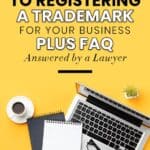



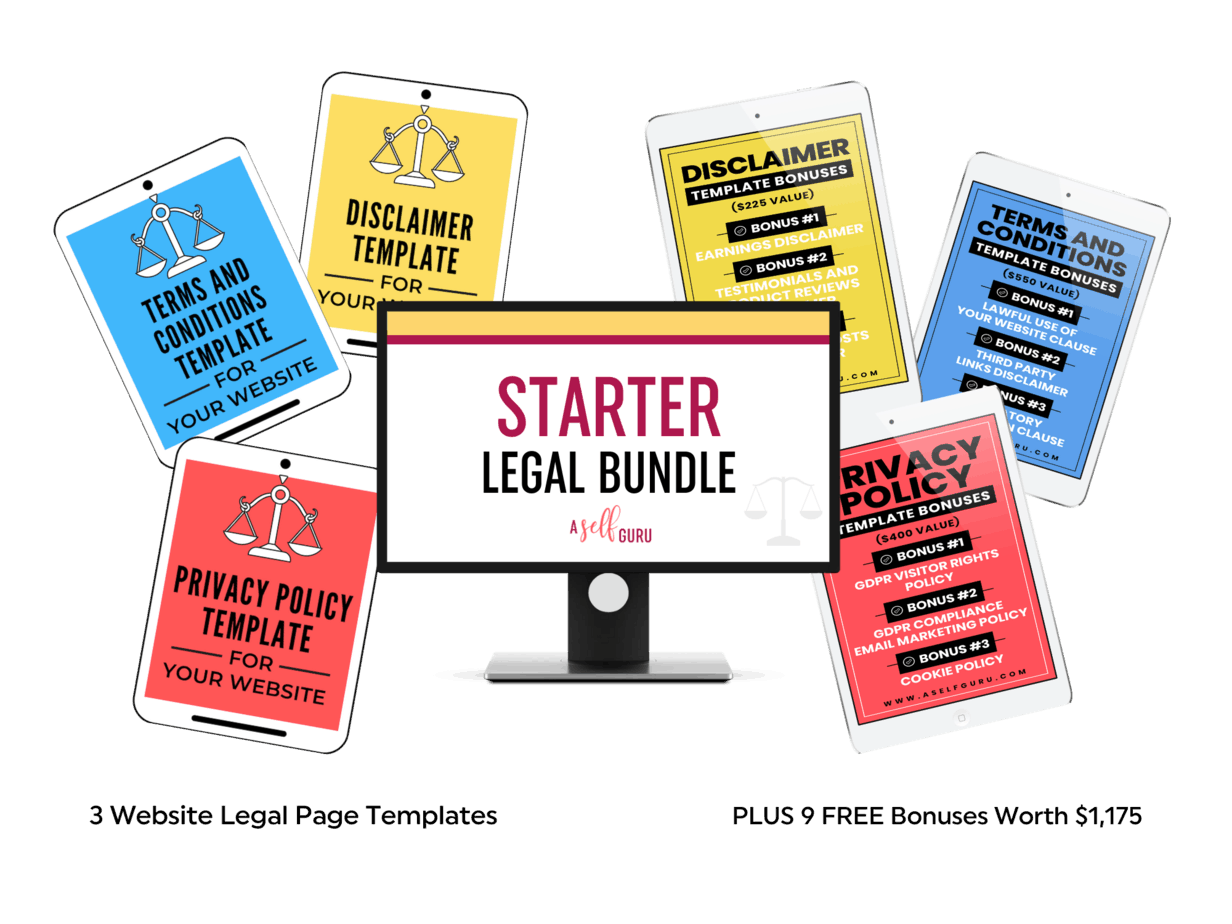

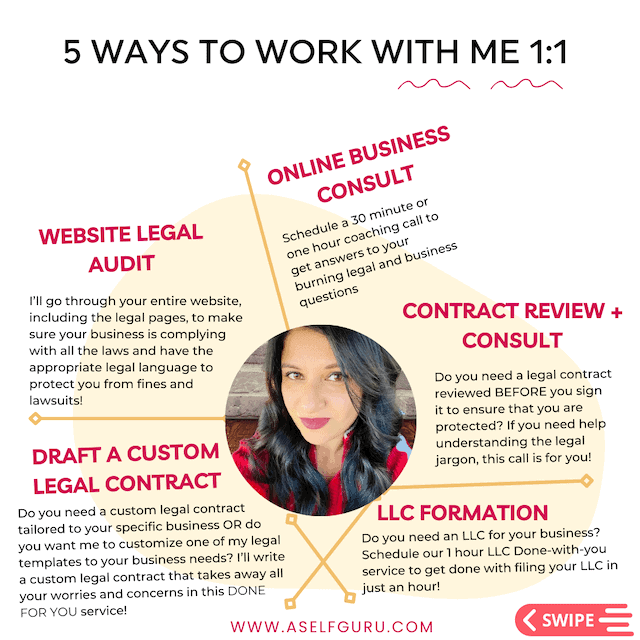
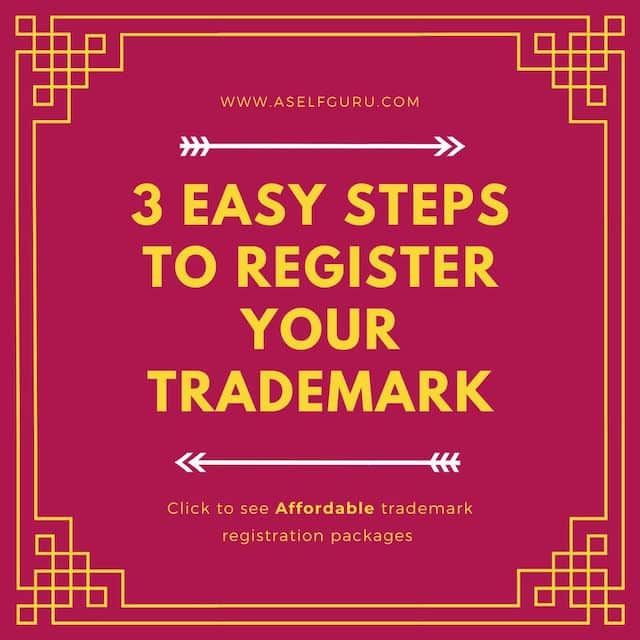

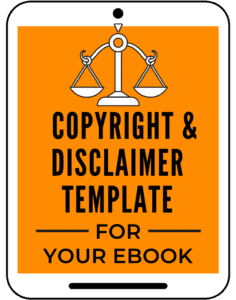

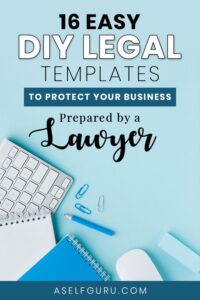



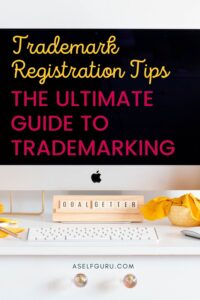
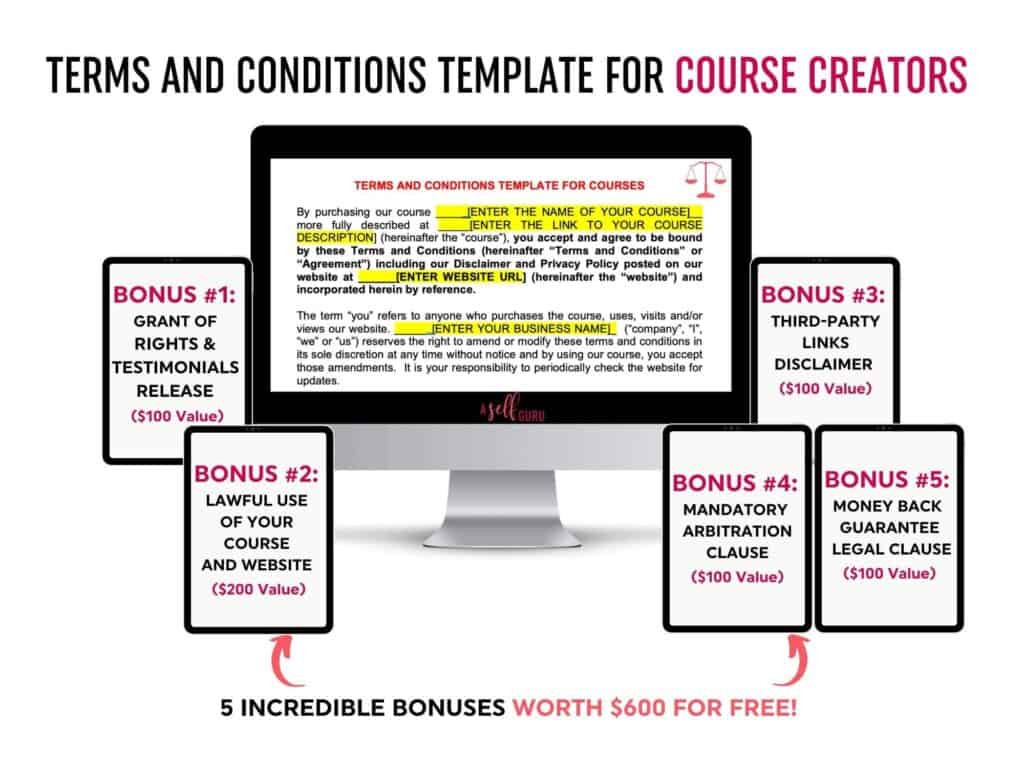
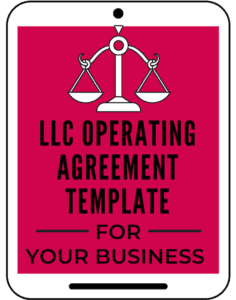

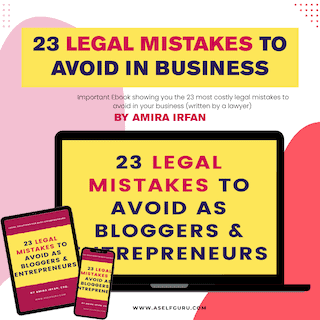
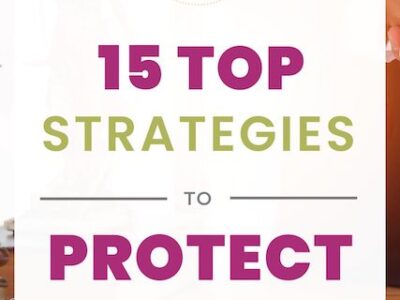








Thanks for such a thorough and clear resource! Legally blogging is an important topic so often overlooked.
You are welcome, Casey!
Another great way to protect my blog. I will definitely look into this in the near future. Thanks!
You are welcome, Tarah!
i finally got my brand name registred trademark last year it was such a long process
Yes, it does take 9 months to a year! Glad to see you registered!
Thank you so much for explaining the importance of trademarks. There are so many things to look into when starting a business, wow=)
Yes, exactly!